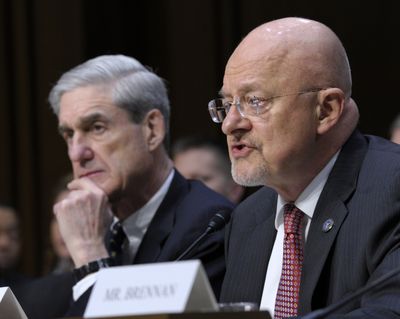Hacking trumps terror as U.S. safety concern
Power generation may be vulnerable

WASHINGTON – Cyberattacks and cyberespionage pose a greater potential danger to U.S. national security than al-Qaida and other militants that have dominated America’s global focus since Sept. 11, 2001, the nation’s top intelligence officials said Tuesday.
For the first time, the growing risk of computer-launched foreign assaults on U.S. infrastructure, including the power grid, transportation hubs and financial networks, was ranked higher in the U.S. intelligence community’s annual review of worldwide threats than worries about terrorism, transnational organized crime, and proliferation of weapons of mass destruction.
The startling reappraisal comes a day after President Barack Obama’s national security adviser, Tom Donilon, complained of “cyber intrusions emanating from China on an unprecedented scale” and said China-based digital attacks on U.S. businesses and institutions had become “a key point of concern” for the White House.
“The international community cannot afford to tolerate such activity from any country,” he warned in a speech at The Asia Society in New York. He urged Beijing to “take serious steps to investigate and put a stop to these activities.”
Appearing Tuesday before the Senate’s intelligence committee, James Clapper, director of national intelligence, said Russia and China are unlikely to launch a devastating cyberattack against the United States outside of a military conflict or crisis that they believe threatens their vital interests. But according to Clapper’s written statement, computer hackers or organized groups “could access some poorly protected U.S. networks that control core functions, such as power generation” although their ability to cause “high-impact, systemic disruptions will probably be limited.”
“It’s hard to overemphasize (cyber’s) significance,” Clapper told the committee.
Clapper testified alongside CIA Director John Brennan; FBI Director Robert Mueller; Lt. Gen. Michael Flynn, who heads the Pentagon’s Defense Intelligence Agency; Matthew Olsen, who heads the National Counterterrorism Center; and Philip Goldberg, who heads the State Department’s Bureau of Intelligence and Research.
The downgrading of the terrorist threat came with notable qualifiers. As was clear in the lethal attack last Sept. 11 on U.S. diplomatic and intelligence compounds in Benghazi, Libya, al-Qaida’s local affiliates and sympathizers in the Middle East and North Africa still seek to harm U.S. interests.
Officials warned that despite setbacks, al-Qaida in the Arabian Peninsula, the affiliate based in Yemen, aims to carry out attacks on U.S. soil and it “continues to adjust its tactics, techniques and procedures for targeting the West.”
But aggressive counter-terrorist operations, including using drone-launched missiles to kill individuals and small groups in northwest Pakistan, “have degraded core al-Qaida to a point that the group is probably unable to carry out complex, large-scale attacks in the West,” Clapper said.
Al-Qaida and its affiliates played little or no role in the popular uprisings across the Middle East and North Africa in 2011. But the fragile new governments in Egypt, Yemen and Libya, and ongoing unrest in Syria and Mali, “have offered opportunities” for what Clapper called “unpredictable” attacks by established or aspiring terrorist groups on U.S. facilities and allies.